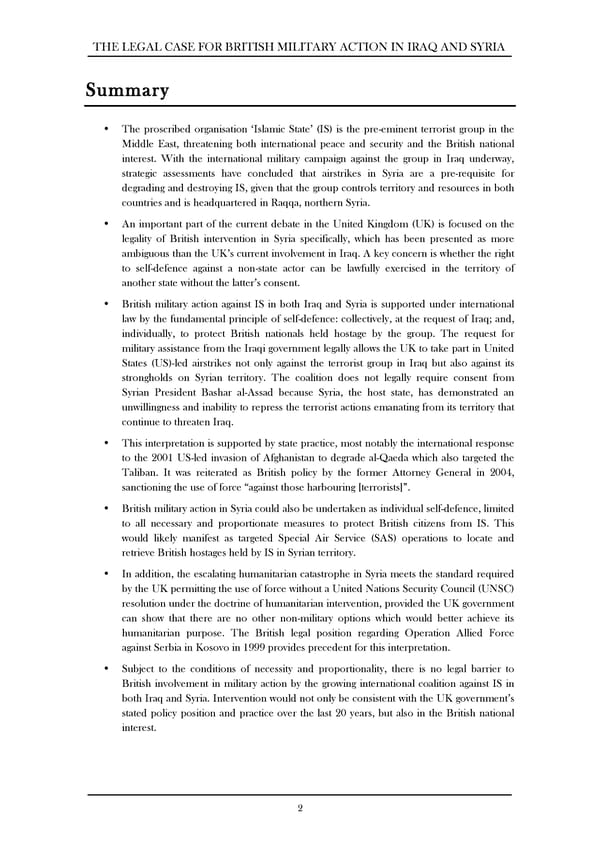THE LEGAL CASE FOR BRITISH MILITARY ACTION IN IRAQ AND SYRIA Summary • The proscribed organisation ‘Islamic State’ (IS) is the pre-eminent terrorist group in the Middle East, threatening both international peace and security and the British national interest. With the international military campaign against the group in Iraq underway, strategic assessments have concluded that airstrikes in Syria are a pre-requisite for degrading and destroying IS, given that the group controls territory and resources in both countries and is headquartered in Raqqa, northern Syria. • An important part of the current debate in the United Kingdom (UK) is focused on the legality of British intervention in Syria specifically, which has been presented as more ambiguous than the UK’s current involvement in Iraq. A key concern is whether the right to self-defence against a non-state actor can be lawfully exercised in the territory of another state without the latter’s consent. • British military action against IS in both Iraq and Syria is supported under international law by the fundamental principle of self-defence: collectively, at the request of Iraq; and, individually, to protect British nationals held hostage by the group. The request for military assistance from the Iraqi government legally allows the UK to take part in United States (US)-led airstrikes not only against the terrorist group in Iraq but also against its strongholds on Syrian territory. The coalition does not legally require consent from Syrian President Bashar al-Assad because Syria, the host state, has demonstrated an unwillingness and inability to repress the terrorist actions emanating from its territory that continue to threaten Iraq. • This interpretation is supported by state practice, most notably the international response to the 2001 US-led invasion of Afghanistan to degrade al-Qaeda which also targeted the Taliban. It was reiterated as British policy by the former Attorney General in 2004, sanctioning the use of force “against those harbouring [terrorists]”. • British military action in Syria could also be undertaken as individual self-defence, limited to all necessary and proportionate measures to protect British citizens from IS. This would likely manifest as targeted Special Air Service (SAS) operations to locate and retrieve British hostages held by IS in Syrian territory. • In addition, the escalating humanitarian catastrophe in Syria meets the standard required by the UK permitting the use of force without a United Nations Security Council (UNSC) resolution under the doctrine of humanitarian intervention, provided the UK government can show that there are no other non-military options which would better achieve its humanitarian purpose. The British legal position regarding Operation Allied Force against Serbia in Kosovo in 1999 provides precedent for this interpretation. • Subject to the conditions of necessity and proportionality, there is no legal barrier to British involvement in military action by the growing international coalition against IS in both Iraq and Syria. Intervention would not only be consistent with the UK government’s stated policy position and practice over the last 20 years, but also in the British national interest. 2
 The legal case for action Page 1 Page 3
The legal case for action Page 1 Page 3